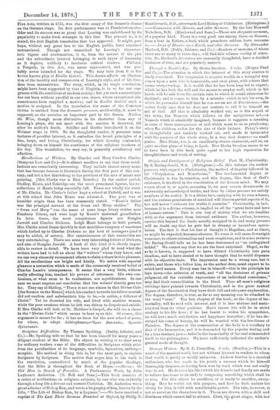Recollections of Writers. By Charles and Mary Cowden Clarke. (Sampson
Low and Co.)—It is almost needless to say that these recol- lections are remarkably interesting. They include almost every name that has become famous in literature during the first part of this cen- tury, and not a few that belong to the province of tho arts of music and painting. (Mrs. Clarke was a Miss Novelle.) In the earlier period, Shelley, Keats, and Coleridge are the most prominent figures, the re- collections of Keats being especially full. These are wholly the work of Mr. Clarke. Mr. Clarke's father kept a school at Enfield, and it was at this school that John Keats was educated. The poet was of humbler origin than has been commonly stated. " Keats's father was the principal servant at the Swan and Hoop stables." The "Swan and Hoop "was the name of some large livery stables near Finsbury Circus, and were kept by Koats's maternal grandfather. In later times, the most conspicuous figures are Douglas 'Jerrold and Charles Dickens. Leigh Hunt belongs to both periods. Mrs. Clarke acted Dame Quickly in that matchless company of amateurs which looked up to Charles Dickens as the best of managers (and it may be added, of actors). Her reminiscences of this connection are very entertainiing. There are some very interesting letters of Dickens, and also of Douglas Jerrold. A book of this kind it is clearly impos- sible to review in detail. We have been very glad to read what the writers have bad to tell us about the "writers" whom they know, and we can very sincerely recommend others to claim a share in this pleasure. All the recollections are bright and kindly. We notice with especial pleasure a correction which is made of the commonly received belief of Charles Lamb's intemperance. It seems that a very little, without really affecting him, touched his powers of utterance. His own con- fessions, or what seem to be confessions, are mystifications. In one case we must express our conviction that the writers' charity goes too far. They say of Shelley, "There is not one clause in that Divine Code the Sermon on the Mount] which his conduct towards his fellow-mortals did not confirm and substantiate him to be,—in action, a follower of Christ." Yet he deserted his wife, and lived with another woman, while the poor creature whom he left was driven to despair and suicide. If Mrs. Clarke will look at St. Matthew's Gospel, she will sea a clause in the "Divine Code" which seems to bear upon this. Of course, this argument is meant for her; it has no force for the new school of poets, for whom, to adapt Aristophanes,—YEaces Oatractlet, Xpar,rbv itanAemit:s.






































 Previous page
Previous page